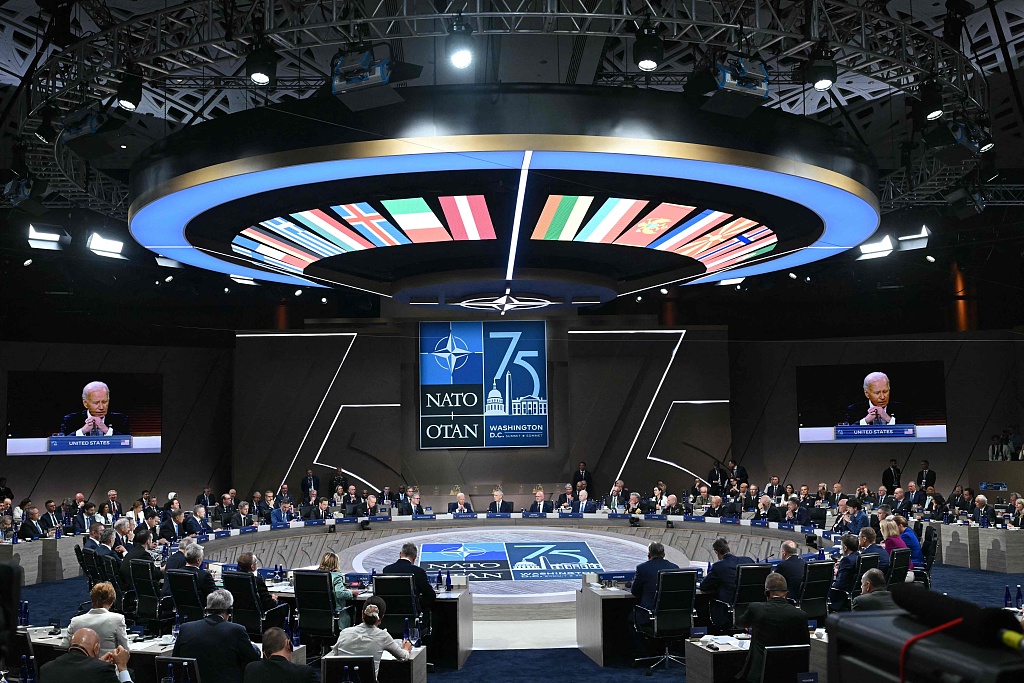
In a communique that NATO released during its summit in Washington on Wednesday, the transatlantic military alliance not only declared Ukraine was on an "irreversible" path to membership of the organization, but also pointed an accusing finger at China, calling the country a "decisive enabler" of the Russia-Ukraine conflict.
The document, which smacks of the Cold War mentality that pervades in Washington, claims that Beijing continues to pose "systemic challenges" to European interests and security. China "cannot enable the largest war in Europe in recent history without this negatively impacting its interests and reputation," it warns.
READ MORE: China strongly opposes NATO's Washington summit declaration
Such remarks are provocative, given the underlying threat conveyed in the message. Moreover, they are based on the false proposition that China bears responsibility for the prolonged conflict, when in fact China has remained a neutral party and it is NATO that has been continually fanning the flames of the hostilities.
Unlike the United States and its NATO allies, which have been steadily supplying ever more sophisticated weaponry to Ukraine, China has never sent lethal assistance to either side, and it has exercised strict restrictions on exports of dual-use goods, including civilian drones. The normal trade relationship that it has maintained with Russia should be free from reproach as it does not target any third party, and conforms to international trade norms.
Actually it is NATO itself that should be blamed for the ongoing Russia-Ukraine conflict. The military alliance, formed in 1949 to contain the former Soviet Union, should have long been dissolved along with the loss of its very reason for existence after the end of the Cold War. Yet despite decades of warnings from Russia, the alliance has transformed from a purportedly collective defense mechanism into an aggressive monster almost doubling in size since the end of the Cold War, and relentlessly pushing its armed front eastward, sowing the seeds of the current conflict.
China is neither a party to nor the creator of the Ukraine crisis. Rather, it has always worked to promote peace talks between Russia and Ukraine and a political settlement to the conflict. The peace proposals it has put forward have won endorsement and praise globally. By blaming China for enabling the ongoing conflict, NATO is trying to make people confuse black with white.
Instead of China posing a security threat to Europe and the West, it is NATO that is seeking to expand to the Asia-Pacific to contain China's rise. Former NATO chief Anders Fogh Rasmussen, in an interview last year, made no secret of the alliance's plan for Ukraine to join NATO to "fix the Russia problem" and after that, "we will free up resources to address the real long-term global challenge: China".
That explains why the alliance, despite calling itself a regional defensive organization in the North Atlantic, is seeking to open a Tokyo liaison office as part of its advance into the Asia-Pacific region. NATO has already been working with Australia, New Zealand, Japan and the Republic of Korea during its recent summits under a so-called "partnership program" to try to form an encirclement around China "to tackle cross-regional challenges".
ALSO READ: NATO's musketeering makes all less secure
It seems that NATO, after causing chaos in Europe, is ready to repeat the same mistake in the Asia-Pacific region.
The Asia-Pacific region aspires to peaceful development. But what NATO is doing is setting the stage for turning the region into a crucible of geopolitical competition, which will unavoidably jeopardize the region's prosperity, peace and stability.
China has been and will always be a contributor to global development and a defender of the international order. NATO should stop hyping up a "China threat" and refrain from stoking up confrontation with the country. Those members that have not lost their reason in the heady scent of putrefied ideology should strive to keep a tight grip on the reins of the organization, which seems intent on rushing headlong into another battle.


